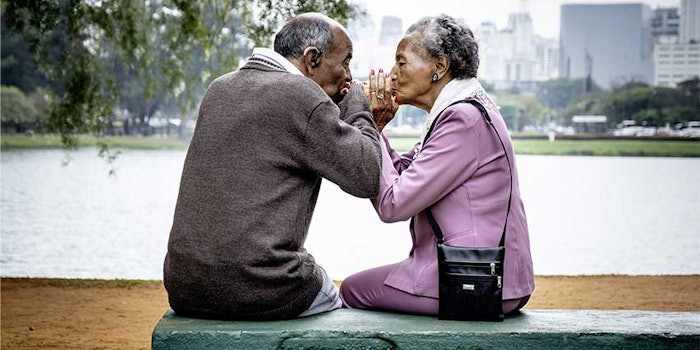
After extensive studies before and during the pandemic, Nivea found consumers were lacking and needing touch. In response, the company launched Care for Human Touch to bring awareness of skin-touch health benefits through global projects.
Beiersdorf's Nivea brand published a report on the state of human touch before and during the COVID-19 pandemic, which revealed a concerning level of physical touch deprivation and loneliness—made worse by the ongoing pandemic. In response, it launched Care for Human Touch.
Nearly half of people surveyed said that the isolation made them feel lonelier than ever before in their lives. The study also found a connection between feelings of loneliness and lack of being in touch with others, both physically and emotionally. With the Care for Human Touch campaign to inspire togetherness, the brand pledges to invest €20 million in local skin touch projects around the world.
See related: How Touch Unlocks Skin Care's Power
Research Methodology
Volume I of the study was conducted by mindline, an independent research institute, as an online survey of 12,207 people in the following 12 countries (approximately 1,000 respondents per country): Australia, Brazil, China, France, Germany, India, Italy, South Africa, Switzerland, Thailand, the UK and the U.S. Survey respondents were between 16-69 years of age and were a representative sample based on gender, age, region and occupational status. The study was conducted pre-pandemic between October 2018 and March 2019.
Focus group discussions were conducted in 11 countries by Happy Thinking People, an independent research institute, which preceded the quantitative research.
Volume II was also conducted by mindline as an online survey of 11,706 people in the following nine countries: Australia, Brazil, France, Germany, Italy, South Africa, South Korea, UK and the U.S. Survey respondents were between 16-69 years of age and were a representative sample based on gender, age, region and occupational status. The study was conducted during the pandemic between April 2020 and October 2020.
See related: Epidermal Evolution; Rhythm, Stress and Touch Response
Study Results
In the comprehensive study, 9/10 respondents before and during the COVID-19 crisis stated that human touch is key to happy and fulfilled lives. Yet this universal desire stays unsatisfied. In the study, 4/5 five people living alone reported that they do not experience human touch on a daily basis and 2/3 respondents wish that they would receive more hugs. People living in single households and single parents, as well as teenagers and millennials, are most affected by loneliness. Twenty three percent of single parents voiced strongly that they feel alone, while 24% of teenagers stated the same versus a global average of 16%.
The physical and psychological health benefits of human touch are scientifically proven but as touch takes a backseat in modern life, the respondents classified its health benefits as “new to them” and at the same time, just as important.
For 7/10 people surveyed, the human touch is not top of mind. Busy lifestyles, the rise of technologies and confusion get in the way of fulfilling people’s needs for skin-to-skin contact. According to Nivea, better knowledge of touch benefits would inspire 86% to include more human touch in their daily lives.
Most people across the globe have accepted the need to be socially distant and have adapted their behavior accordingly, for now. The survey showed that people around the world have sacrificed physical touch during the pandemic and often endured loneliness as a result. Of those surveyed, 75% said that isolation has made them realize how important physical touch is for health. More than one-third of people globally expect inner circle (i.e., family and close friends) touch to increase after the crisis, while outer circle touch (i.e., colleagues and acquaintances) is expected to decline in the long run as a result of the pandemic.
Care for Human Touch
With its initiative #CareForHumanTouch, Nivea supports skin touch projects to promote the quality of life for people at risk of loneliness such as babies born preterm, visually impaired individuals and the elderly with dementia. The brand also aims to make 100 million people aware of the proven health benefits of skin touch by 2025.
“Nivea has always cared for skin and we have always cared for people. This is what defined Nivea from the start,” said Stefan De Loecker, chief executive officer of Beiersdorf AG. “With our contribution, we want to make a difference, and we will use Nivea’s influence and reach to spread awareness of the positive health effects of human touch.”
“Driving awareness of the need for and the health benefits of skin touch is crucial,” said Ralph Zimmerer, vice president of global Nivea brand identity and brand capability. “We will take on this role and continue to be the custodian of human touch and togetherness. While we are forced to stay socially distanced from each other during the pandemic, we have to maintain and deepen our close relationships as a shield against loneliness. Within our close family, skin touch is therefore more important than ever.”










